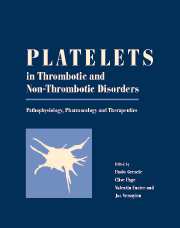Book contents
- Frontmatter
- Contents
- List of contributors
- Editors' preface
- PART I PHYSIOLOGY
- PART II METHODOLOGY
- PART III PATHOLOGY
- PART IV PHARMOLOGY
- 61 Aspirin
- 62 Pharmacology of ticlopidine and clopidogrel
- 63 Platelet membrane glycoprotein (GP) IIb–IIIa antagonists and acute arterial thrombosis
- 64 Other antiplatelet agents
- 65 Pharmacogenetics as a new antiplatelet strategy
- 66 Cardiovascular gene therapy: implications for platelet vessel wall interactions
- 67 Pharmacological modulation of the inflammatory actions of platelets
- PART V THERAPY
- Afterword: Platelets: a personal story
- Index
- Plate section
63 - Platelet membrane glycoprotein (GP) IIb–IIIa antagonists and acute arterial thrombosis
from PART IV - PHARMOLOGY
Published online by Cambridge University Press: 10 May 2010
- Frontmatter
- Contents
- List of contributors
- Editors' preface
- PART I PHYSIOLOGY
- PART II METHODOLOGY
- PART III PATHOLOGY
- PART IV PHARMOLOGY
- 61 Aspirin
- 62 Pharmacology of ticlopidine and clopidogrel
- 63 Platelet membrane glycoprotein (GP) IIb–IIIa antagonists and acute arterial thrombosis
- 64 Other antiplatelet agents
- 65 Pharmacogenetics as a new antiplatelet strategy
- 66 Cardiovascular gene therapy: implications for platelet vessel wall interactions
- 67 Pharmacological modulation of the inflammatory actions of platelets
- PART V THERAPY
- Afterword: Platelets: a personal story
- Index
- Plate section
Summary
Introduction
GP IIb–IIIa (αIIbβ3 in integrin nomenclature), the most abundant protein on the platelet surface, is the primary receptor mediating platelet aggregation, a process central to acute arterial thrombosis and to hemostasis. Indeed, its central role in aggregation positions GP IIb–IIIa at the heart of thrombosis and has directed aggressive strategies into developing a new class of drugs, termed GP IIb–IIIa antagonists, which block the binding of adhesive proteins to GP IIb–IIIa thus preventing platelet aggregation. GP IIb–IIIa antagonists have been shown to efficiently regulate platelet function, and to have a therapeutic benefit in reducing the acute thrombotic complications associated with coronary artery disease. The pivotal role that GP IIb–IIIa serves in platelet aggregation arises due to the dynamic nature of this receptor which displays several functional activities that are important not only in understanding how this receptor is involved in platelet aggregation and thrombosis, but also, ultimately, for understanding how GP IIb–IIIa antagonists can be more effectively utilized to optimize their antithrombotic activities.
This chapter summarizes the role of GP IIb–IIIa in platelet function and the use of GP IIb–IIIa antagonists for the regulation of platelet functions involved in acute arterial thrombosis. The themes to be developed are threefold. First, GP IIb–IIIa is involved in a wide spectrum of reactions affecting platelet function and vascular biology. For example, while the central role of GP IIb–IIIa in platelet aggregation and thrombosis is well known, its central role in platelet function also involves it in clot formation, fibrinolysis, vascular remodelling and inflammation.
- Type
- Chapter
- Information
- Platelets in Thrombotic and Non-Thrombotic DisordersPathophysiology, Pharmacology and Therapeutics, pp. 940 - 954Publisher: Cambridge University PressPrint publication year: 2002



